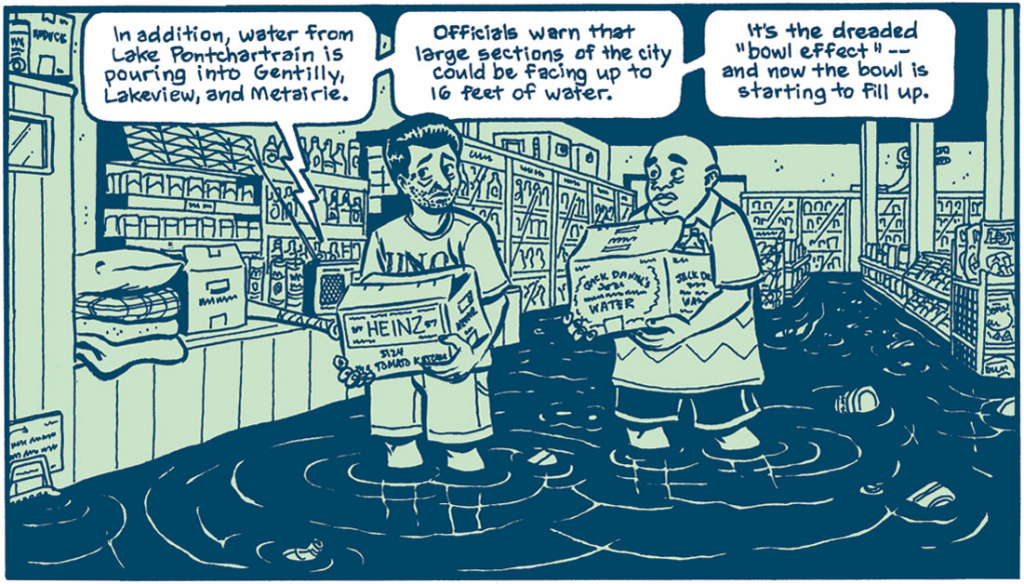„Capture the essential truths at the heart of the stories“
Interview mit Josh Neufeld: zum Panel
„Echter als echt – grafische Reportagen und Comic-Journalisten“
Die Umsetzung komplexer Reportagen in Grafiken und Comics lebt. Anders als im Fernsehen oder im Print können mit der alten Kunstform „Illustration“ – kombiniert mit modernen Recherchetechniken emotional aufwühlende Geschichten erzählt werden, die Leser direkt ins Geschehen ziehen. Es werden die Bilder gezeigt, die es nicht geben kann – Szenen, bei denen es keine Zeugen gab, werden lebendig. Während die Szene der Comic-Journalisten in Deutschland sehr überschaubar ist, gibt es in den USA bereits etliche Ikonen der Branche. Einer davon ist der US-amerikanische Comic-Journalist Josh Neufeld. Er sagt: „Comics are about showing, not telling.“
Hi Josh, why do you like comic journalism?
Comics journalism is the merger of two my passions: creating comics and staying engaged with the larger world. Effective comics journalism makes you see the world in new ways, and brings you closer to events as they happened to real people. I also love the freshness of comics journalism, that it’s a segment of the comics industry that’s still in its infancy, and to many people it’s surprising — or even shocking — to think that comics can be used in the service of journalism.
What are the most important points in comic journalism to you?
When it comes to comics journalism, no one practices the form better than Joe Sacco, who popularized it for the rest of the world. He combines intense on-the-ground research, direct interviews, and tons of photographic reference with his considerable cartooning skills to create powerful works of comics journalism. His model is what inspired me, that combination of solid reporting and detailed „comicking.“
What can be shown?
Since the form is still so young, opinions vary about this. I’ve heard that Sacco will not draw any place he has not been to himself or personally photographed. Other practitioners of the form will not paraphrase any subject’s word to create good quotes. Personally, I take more liberties: in the past, I have shown events that I don’t have direct testimony about, and even put words in characters‘ mouths (based on interviews with them or witnesses to the scene). My interest above all is to make GOOD comics, to make the scenes come alive. Comics are about SHOWING, not telling. The worst thing you can do is to make boring comics filled with talking heads.
As I said, however, opinions vary. Austrian grad student Lukas Plank thinks comics journalism needs a set of rules, of best practices. He outlines them in a clever comic he published on his Tumblr site: http://drawntruth.tumblr.com. Some of his rules — like not combining multiple characters into one, or showing a scene happening where it didn’t — make sense. Others, like showing icons in each panel of the source for that panel, are very cumbersome.
In the end, I want my stories to be captivating, thought-provoking, and to FEEL real, to capture the essential truths at the heart of the stories I tell.
What is the benefit in comic journalism, if you compare it to TV or print journalism?
With comics you can portray events in an illusion of „real time“ that simply can’t be conveyed in print or on radio or TV. In the right hands, comics convey a sincerity that allows the most intimate (or terrifying) experiences to be communicated to the reader. Good comics journalism doesn’t feel like a „reenactment“ — it feels real, like you’re right there with the subject having those experiences. (On the other hand, there are certain types of stories — particularly those with complicated or abstract ideas, or those without a lot of inherent „action“ — that are not optimal for a comics journalism treatment. Those stories may be handled better in print/internet, on TV, or on the radio.)
What do you expect: will comic journalism grow in the area of internet? Or will it stay in its niche?
Comics journalism is exploding as a field right now. I’m a member of a listserv which adds new members weekly. More and more mainstream journalism outlets are hiring cartoonists to tell stories. For instance, right now I am working on a lengthy piece about consumer data and privacy for the interactive team at Al Jazeera America. It will debut later in the summer. I have high hopes for this branch of the nonfiction comics movement!
